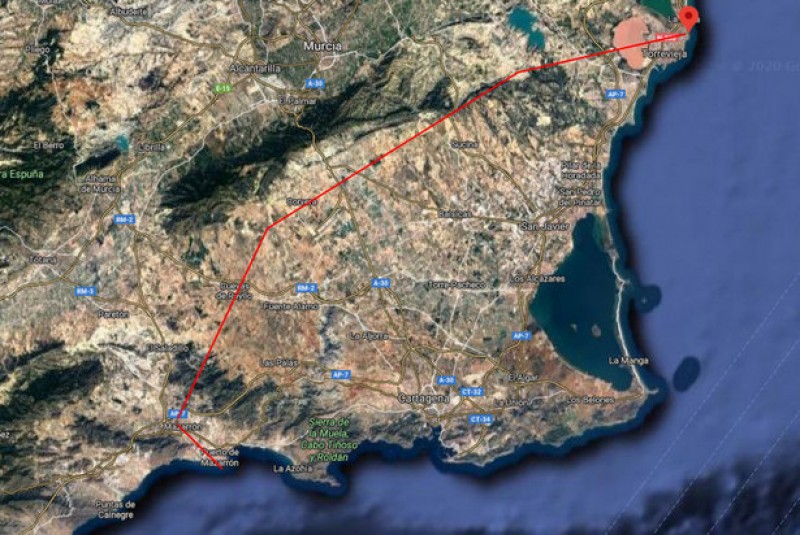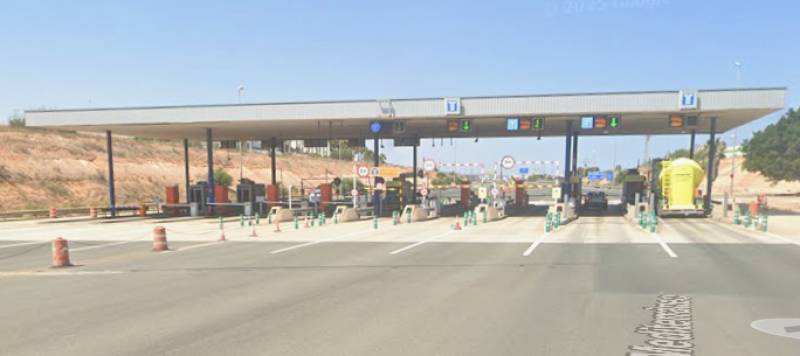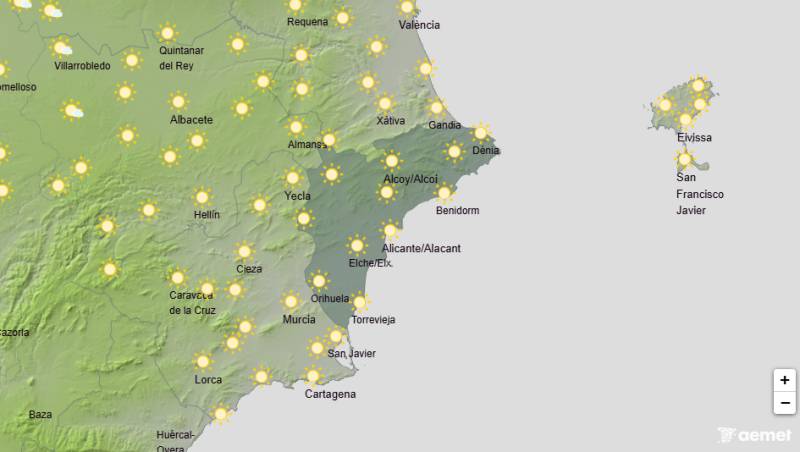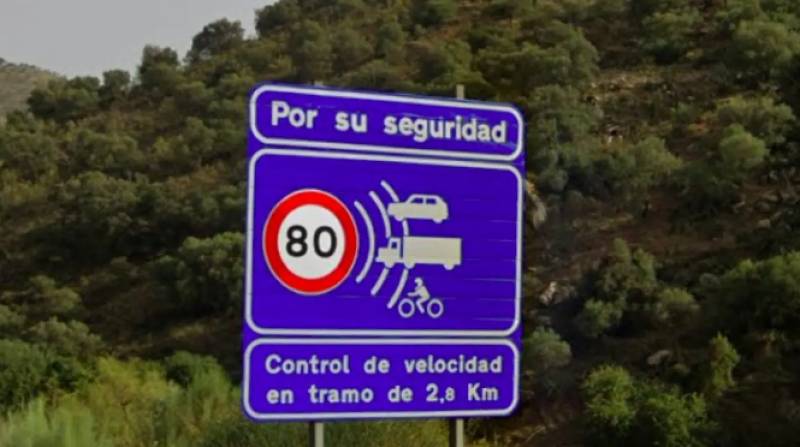
To be listed on the haciendadelalamo TODAY MAP please call +34 968 018 268.
Brexit collides with 1975 military law in Spain; British housebuyers must now obtain military permits in parts of the Vega Baja
(Note: the limit of the military importance zone is not exact but approximate)
Purchasers from third countries buying in areas designated as “Zones of Interest for National Defence” along the coastlines of Spain must obtain a military permit to do so
Cases have already started to appear in the Costa Blanca and Costa Cálida
Three weeks after the UK left the European Union various of the consequences and inconveniences caused by Brexit are beginning to become apparent, one of which could potentially create a major obstacle for British nationals hoping to buy properties in many parts of Spain, particularly the south-east of the mainland.
A legal complexity described by some real estate professionals in the southern Costa Blanca and the Costa Cálida as “absurd” is already causing anger and frustration to be vented on social networks as buyers, vendors and estate agents are left “tearing their hair out” (according to one solicitor in the Region of Murcia) by delays of up to six months in the completion of sales.
The origin of the obstacle which now stands in the way of some British purchasers is a law first outlined in 1975, (see BOE link) during the last days of General Franco’s dictatorship, which was eventually enshrined in Royal Decree 689 of 1978. This Law establishes a series of “Zones of Interest for National Defence” along the coastlines of Spain and establishes that for non-Spaniards buying a property within these zones it is necessary to obtain a special “military permit”.
(The Law also establishes limits on the amount of property which can be acquired by foreigners, thus limiting the ability of business and commercial entities to purchase large tracts of land.)
It has since been stipulated that the process of military authorization is not required for purchasers who are from other EU or Schengen countries, but the Law has been invoked frequently over the last 40 years in the cases of properties acquired people from the USA, Canada, Russia, China, parts of eastern Europe and the rest of the world.
Since 1st January, it has been applicable to those from the UK due only to the fact that the UK has left the European Unon and Schengen zone and it is reported that notaries have been instructed not to grant title deeds if the relevant permit is not obtained.
Unsurprisingly, however, British nationals have remained in blissful ignorance of the legislation until now, when they suddenly find that the completion of property transactions is being delayed by the unforeseen need for extra paperwork. In theory - although not always in practice, according to sources consulted by Murcia Today – buyers from the UK must now provide a 5-year criminal record (plus a certified sworn translation, both apostilled by a notary) and detailed plans of the property being acquired, and this in turn can entail extra expenses if the required detail is not featured on already existing plans.
These documents then have to be sent to the military authorities – in Barcelona if the property is in the Costa Blanca, in Sevilla if it is in the Region of Murcia – and processed.
Add in the inevitable solicitors’ fees and a delay of between 4 and 6 months, and the obstacles being placed in the way of some buyers could easily be enough to put them off buying in the area.
Many of the problems are actually surfacing in the Vega Baja area of the Alicante province, which are included within the military zone area and one frustrated would-be buyer said this week; “Just been informed by our solicitor last night we cannot exchange on a property in La Zenia on 5th February. Because it is classed as in a Military Zone (San Javier) and we are non European from a 3rd Country.”
And there are many other cases in process at the moment.
The law of 1978
Annex II of the 1978 law specifies 6 large areas of “Interest for National Defence” in which the rights of foreigners to acquire property are restricted. These are broadly defined as being the zones of Cartagena (one of Spain’s most important naval bases), the Strait of Gibraltar, the Bay of Cádiz, the frontier with Portugal, Galicia and the border with France.
Each of these areas is then defined in sweeping terms by sectioning off a large area of land: in the case of Cartagena the delimitation runs along a line from Cabo Cervera in Torrevieja to Punta Negra in Mazarrón. The line runs through San Miguel de Salinas, Montes de Alcor y de Columbares, Los Baños, Corvera (where the Region of Murcia International Airport opened two years ago), Los Arcos, Corverica, Fuente Álamo, Monte Algarrobo and Mazarrón, and in theory all points to the south east of the line are subject to the restrictions on foreign purchasers.
However, legal sources clarify that the restrictions do not apply to “núcleos urbanos consolidados” (or “established built-up areas”), although exactly what constitutes an “established built-up area” is hard to define. What does seem clear is that in the most part rural areas are more likely to be affected, although the exact interpretation of the legislation in each area is determined by the official local Property Registrar and some are more zealous than others in applying the legislation.
Up until now, this law has mainly affected Russian and Chinese buyers; in 2015 Murcia Today wrote about this situation affecting the interest of Russian buyers in the Region: click to read this article
And also in 2015 Alicante property agents requested a change to the law to help them boost sales to Russian buyers. Click to read this article.
The effect on Murcia and the southern Costa Blanca
In total some 1,560 of the 8,000-plus municipalities of Spain are affected by the 1978 Law, but those where the effects are likely to be most strongly felt are the Vega Baja area of the south of the province of Alicante and the Region of Murcia, due to the sheer number of purchases which are made by UK nationals.
In the Vega Baja municipalities of Torrevieja, Orihuela, San Miguel de Salinas and Pilar de la Horadada, which are located as far as 60 kilometres from the Naval Base in Cartagena, around 800 properties a year are bought by UK nationals (leaving the effects of the pandemic out of the equation), and that whereas until now around 150 applications for military permits were being processed per year the figure could now rise to close to 1,000.
Similar increases might be expected in Murcia, where UK nationals consistently account for very high proportions of the properties bought by non-Spaniards, particularly in the area in and around Mazarrón and along the coast of La Manga and the Mar Menor.
Other parts of Spain where the problem is already becoming apparent include the Balearic Islands: in Ibiza Britons are now free to purchase in-town apartments but potentially face this administrative obstacle in rural areas.
Of course, the application of the 1978 law to British buyers in these areas could easily lead to a backlog in the system and to delays becoming even lengthier – and until the necessary permit is issued, the sale cannot be finalized before a notary and mortgage loans cannot be signed as the bank cannot know what the prevailing interest rate will be when the permit finally arrives.
In consequence, the vendor is left waiting, the buyer is left waiting, the bank is left waiting, the estate agent is left waiting and the Spanish reputation for lengthy bureaucratic delays is strengthened while the image projected of the country is potentially damaging for future sales.
Is a solution likely?
There is widespread acknowledgement of the absurdity of the rules as they stand, but for the time being at least they remain in place.
However, Spain and the UK are still involved in on-going talks regarding matters of national security and defence. Topics on the agenda include the fight against Jihadism, cyber-defence and jointly managed military operations as well as the situation in Gibraltar, but it would seem that the Law of 1978, which so far seems to have been overlooked during the run-up to Brexit, could be added to the list.
It is worth remembering that the Law was first proposed in the context of the Cold War and before Spain had joined either NATO or the EU, when foreigners were treated far more readily as enemies under Franco’s rule.
In addition, of course, the existence of internet was not even imagined, and the way in which documentation still has to be submitted belongs to the age of typewriters and “snail mail” without any allowance being made for the speeding-up of the procedure which could be achieved by online processing.
Common sense would dictate that if the Law and its application to UK nationals (and those from other countries) are irrelevant, unjustified and harmful to the interests of all those involved – including Spanish vendors and estate agents, of course - then either an exemption will be granted or the Law will be changed. But in matters such as these common sense does not always prevail, and experience suggests that if one of these solutions is eventually adopted there may yet be a considerable delay before the changes take effect.
This is not to say that ALL property transactions will be affected, but for those currently in the process of buying or selling in these areas, it is advisable to check with your legal representative whether your property is affected, and be aware that this change in the status of British nationals since they left the EU, will unfortunately cause delays in some property transactions.




































